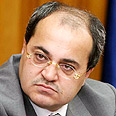
The highway leading to this Arab town in central Israel was lined with blue-and-white Israeli flags Wednesday to mark the Jewish state's 60th independence day. But Kufr Qassem itself was entirely bereft of banners.
Israeli Arabs, who make up one-fifth of Israel's population of 7.25 million, aren't celebrating. Six decades after the founding of the Jewish state, they still feel like outsiders. They mix their Arabic with Hebrew and actively participate in Israel's democracy. But for the most part, they define themselves as Palestinians who live in Israel, and remain a distinct and largely disadvantaged minority.
"It doesn't mean anything to me," Umm Ziad, owner of a small bookshop in Kufr Qassem, said of the festivities in the neighboring Jewish community of Rosh Haayin, just a few hundred meters (yards) away. "It's not our party," added the 32-year-old mother of three, dressed in a dark maroon robe and white veil.
Many Israeli Arabs are torn between two loyalties. They have more freedoms than most in the Middle East - even though they spent the first 18 years of Israel's history under military rule - and Palestinians in the West Bank and Gaza tend to resent them for their more comfortable lives. Yet Israeli Arabs are distrusted by the Jewish majority and have been subjected to decades of official discrimination.
"We are ready to build bridges with parts of the Jewish community, but coexistence can only happen when there are equal rights," said Ahmed Tibi, an Arab member of Israel's parliament and a long-time adviser to the late Palestinian leader, Yasser Arafat.
Tibi said Israeli Arabs face unequal treatment in all walks of life, from land allocation to education, and noted that only 4 percent of Israel's development budget is spent in Arab communities.
Kufr Qassem, with a population of 20,000, doesn't have an allocated industrial zone, although the mayor, Sami Issa, said he's lobbied for years for the Israeli government to invest in one.
'People here don't have hope'
That would help earn tax money to fix the town's bumpy roads and shabby buildings, adorned with garish Arabic and Hebrew signs. Nearby Rosh Haayin, with 50,000 people, has smooth roads, chic coffee shops, a large industrial zone and gleaming buildings there host international companies. Over the past 60 years, Israel's Arab and Jewish communities have largely remained separate. Intermarriage is still taboo, and only a few towns, such as Haifa, Jaffa and Ramle, have mixed populations.
Israeli Arabs are less educated, on average, and earn less than their Jewish counterparts. Arab women tend to be homemakers and in general, Arab families are larger than Jewish ones.
Fueling the fears of Israeli Jews, government statistics show that Israeli Arabs have one of the highest birth rates in the region, ahead of neighboring Syria, Jordan, Egypt and Lebanon.
Kufr Qassem, a conservative Muslim town, is considered well off because of its proximity to Tel Aviv, Israel's business capital, which offers plenty of jobs. Residents freely admit that economic opportunity is one reason they want to stay in Israel.
They don't like recent talk by hard-line Israeli politicians who want Arab towns in Israel to become part of a future Palestine, in a swap for Jewish West Bank settlements.
Ismail Issa, 39, a local barber and poet, said he'd like to see a bi-national state of Arabs and Jews between the Mediterranean and the Jordan River, instead of separate Jewish and Palestinian states, the goal of current peace efforts. In the meantime, he said, "I carry an Israeli passport, and I have to respect it."
A monument in Kufr Qassem's center commemorates the events of 1956 when nearly 50 villagers - unaware that a curfew had been imposed on Israeli Arabs on the eve of Israel's Sinai Campaign - were shot to death by Israeli border police as they returned home after the deadline. Every year, thousands of Arab Israelis gather at the monument, and local residents frequently refer to the massacre by way of emphasizing that they will stay in their village, regardless of what happens.
The fate of Israel's rapidly growing Arab minority is seen as key to Israel's future. Further alienation could one day destabilize the Jewish state, while Arab citizens with a sense of belonging could build bridges to Israel's neighbors.
For now, the future doesn't look bright, said the mayor, Sami Issa. "People here, generation after generation, don't have hope, and don't feel like they have a future. That's very dangerous," he said. "If you are full and live next to a hungry man, he might not hurt you today. But he'll hurt you tomorrow."















